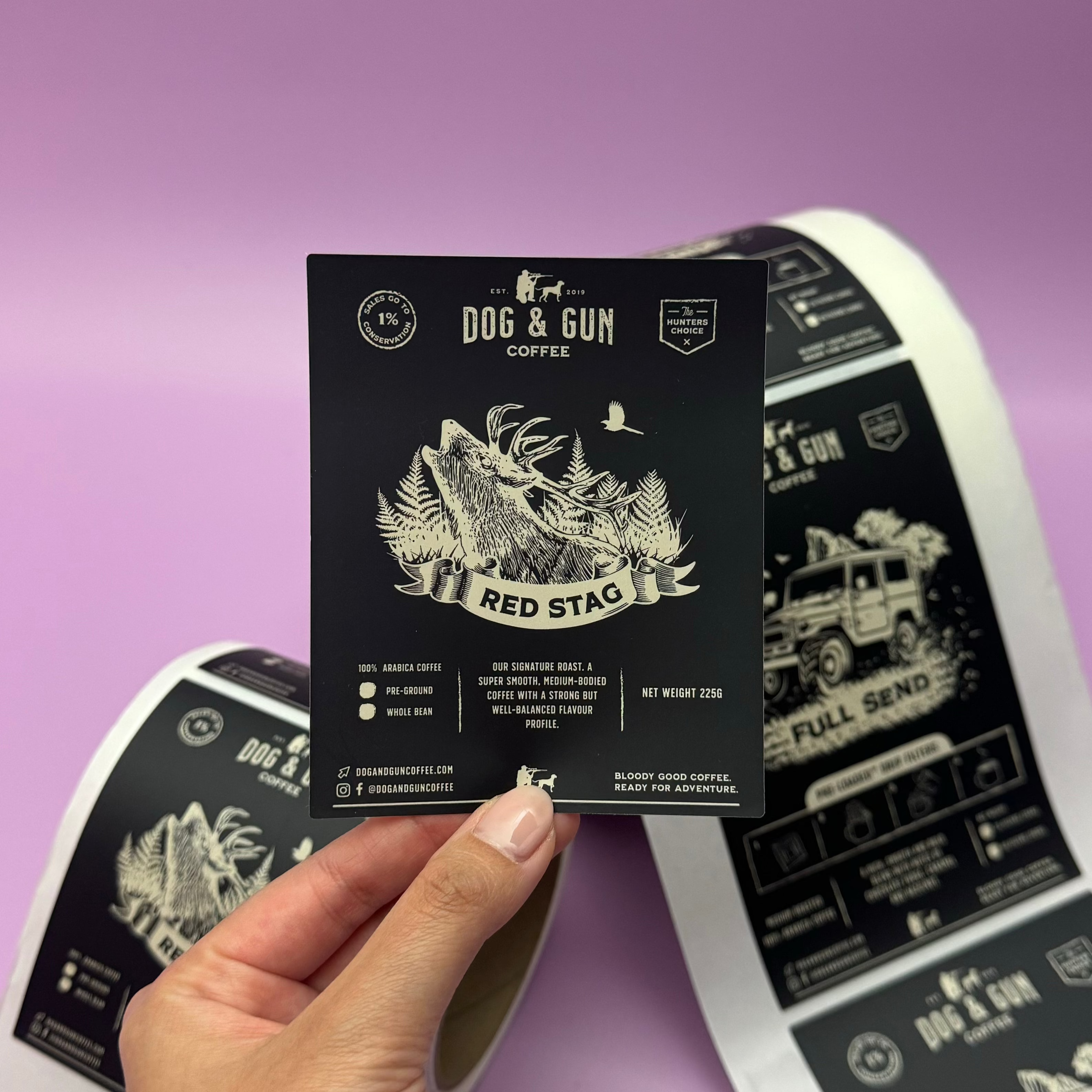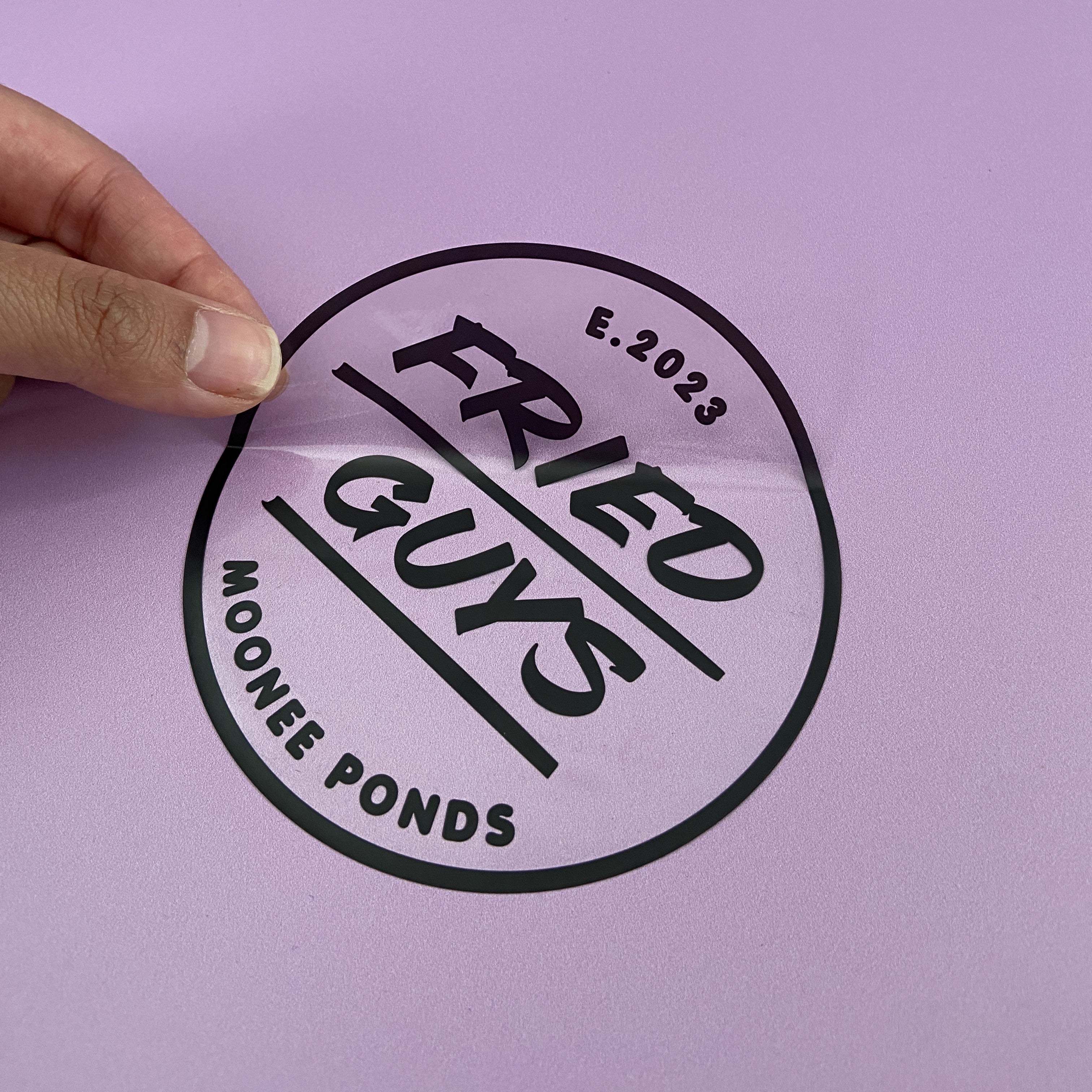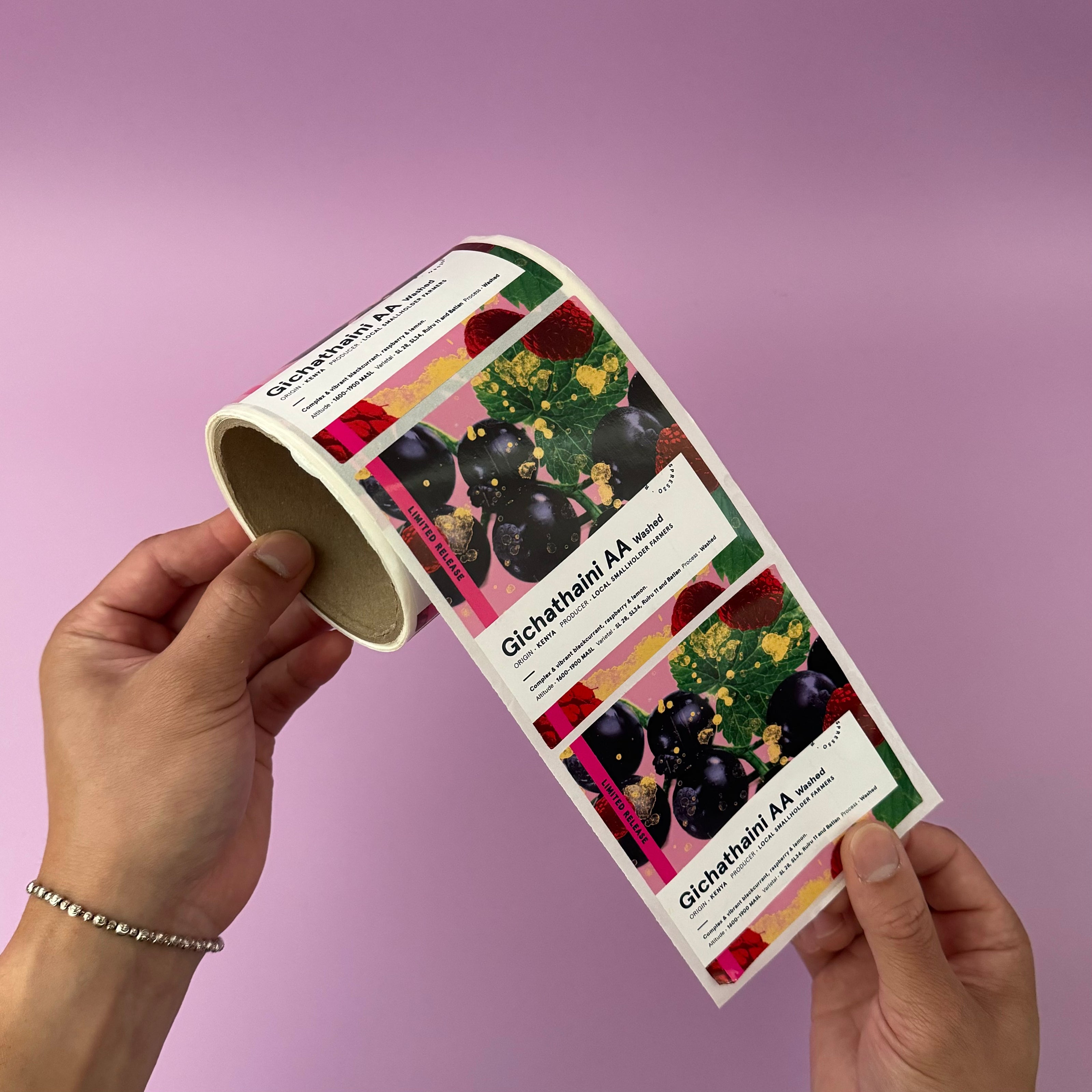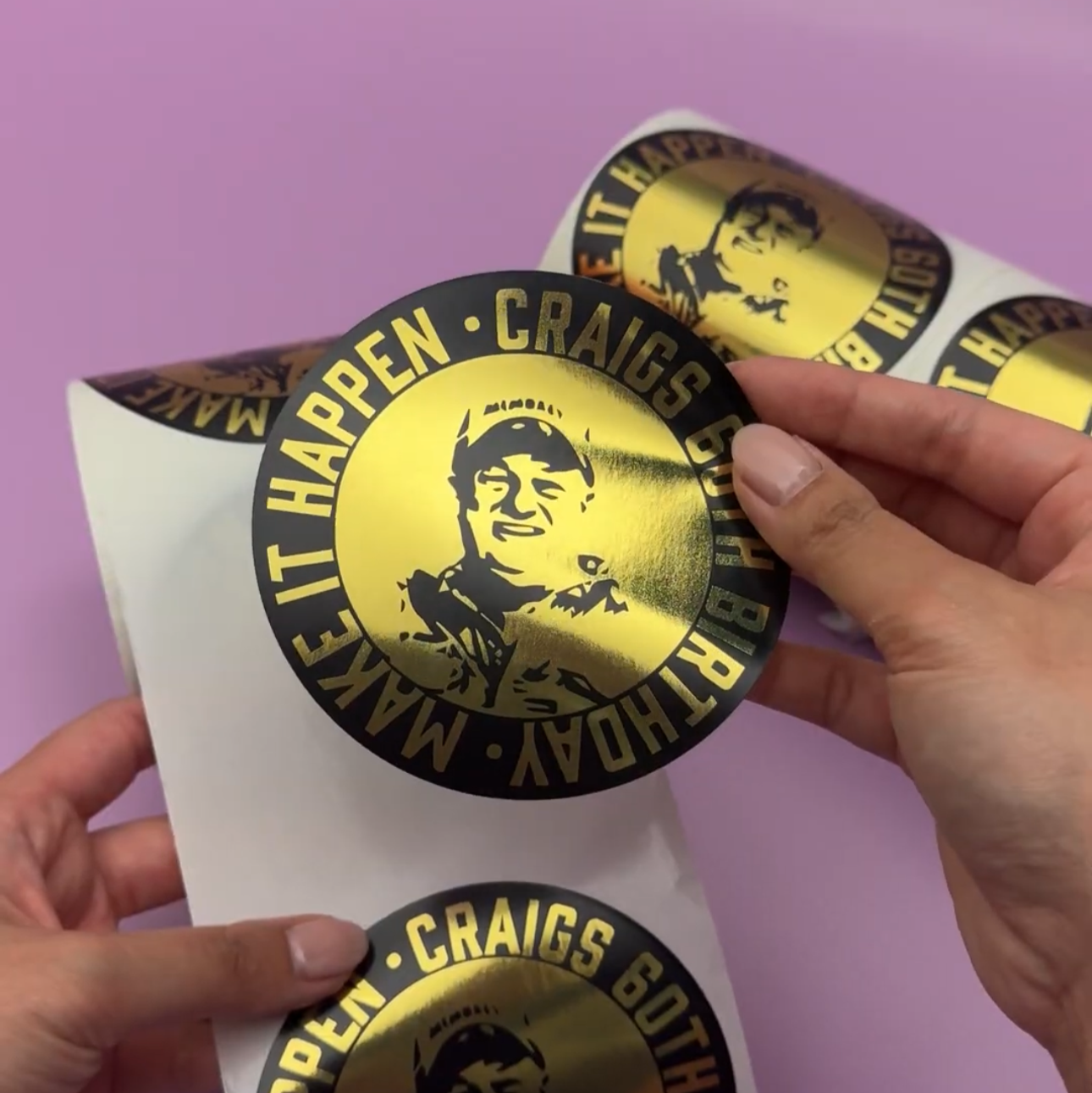Great for products and promotional
Synthetic (BOPP)

What is Synthetic (BOPP)?
Commonly used for label making. What sets it apart is its unique combination of durability, waterproof properties, and resistance to oils. It's an excellent choice for labels that need to withstand various environmental conditions, including exposure to moisture and contact with oils or greases.
Notably, White Vinyl is cost-effective, offering a balance between affordability and high-performance labelling.
Advantages
- Durability: Well-suited for labels requiring strength and resilience against environmental challenges.
- Waterproof: Ideal for applications where labels may come into contact with moisture or damp conditions.
- Oil Resistance: Resistant to oils and greases, making it suitable for labels in environments with these substances.
- Affordability: Cost-effective option, balancing performance and budget considerations.
- Customizable Sizes: Available in various sizes, providing flexibility to meet specific labeling needs.
- Versatility: Comes with a range of liners and adhesives, adapting to different surfaces and adhesion requirements.
Considerations
- Opaque Appearance: The white color may not be suitable for applications where transparency or visibility of the underlying content is essential.
- UV Sensitivity: Like many materials, White BOPP may be sensitive to prolonged exposure to UV radiation, which could impact its longevity.
- Specific Design Considerations: Printing and design may need to be adjusted based on the color and characteristics of White BOPP.
Great for products and promotional
Clear Synthetic (BOPP)

What is Clear Synthetic (Clear BOPP)?
Clear Vinyl is a transparent plastic material commonly used in label making. Unlike its white counterpart, Clear Vinyl is see-through, allowing for a visually appealing and transparent label application. This material is known for its clarity, which makes it a suitable choice for labels where maintaining visibility of the underlying content is crucial.
Advantages
- Visibility: Ideal for labels where showcasing the underlying content is essential due to its transparent nature.
- Aesthetics: Provides a clean and modern appearance, enhancing the overall look of the labelled product.
- Durability: Offers a protective layer, making it suitable for labels that need to endure various environmental conditions.
- Water Resistance: Like other Vinyl materials, Clear Vinyl is resistant to water, ensuring labels remain intact in damp conditions.
- Oil Resistance: Provides resilience against oils and greases, making it suitable for applications involving contact with these substances.
Considerations
- Not Ideal for Opaque Surfaces: Its transparency may not be suitable for labels on opaque or dark-colored surfaces where contrast is essential.
- Printing Limitations: Clear Vinyl may have limitations in terms of certain printing techniques, and designs may need to be adapted accordingly.
- UV Sensitivity: Clear Vinyl may be susceptible to UV radiation, which could impact its long-term clarity in prolonged exposure to sunlight.
Great for products and promotional
Paper

What is Paper?
Designed for label printing, this high gloss white cast coated paper offers a mirror-like finish that ensures excellent contrast and brilliance. Its exceptional mechanical and humidity resistance make it particularly well-suited for high-quality, multi-colored labels.
Advantages
- Eco-Friendly Option: Embrace sustainability with paper labels, contributing to a greener environment.
- Versatile Aesthetic Appeal: Whether enhancing the presentation of artisanal products or adding a professional touch to office documents, paper labels provide a textured and elegant look.
- Seamless Customization: Enjoy the ease of customization as paper labels are easy to print on, allowing you to personalize them with designs or essential information.
- Lightweight and Compatible: The lightweight nature of paper labels ensures compatibility with various surfaces, making them suitable for a range of applications.
Considerations
- Indoor Suitability: Paper labels excel in indoor settings, making them a suitable choice for products, documents, or items that won't face outdoor exposure. However, for applications requiring resilience comparable to vinyl, alternative materials may be more appropriate.
- Limited Durability: Keep in mind the finite durability of paper labels, especially when compared to more robust materials like vinyl. If your labeling needs involve challenging outdoor conditions, exploring alternatives for enhanced longevity is advisable.
- Vulnerability to Water: Due to their non-waterproof nature, it's crucial to protect paper labels from moisture to prevent damage or fading. While they offer versatility, they may not withstand water exposure as effectively as vinyl alternatives.
Great for products and promotional
Silver Synthetic (BOPP)

What is Silver Synthetic?
Silver Gloss Vinyl is a type of plastic film with a shiny, reflective silver finish. It is commonly used in label manufacturing and packaging for its distinctive visual appeal. The "gloss" in its name refers to the reflective and smooth surface of the material, adding a polished and lustrous appearance to labels.
Advantages
- Visibility: Ideal for labels where showcasing the underlying content is essential due to its transparent nature.
- Aesthetics: Provides a clean and modern appearance, enhancing the overall look of the labelled product.
- Durability: Offers a protective layer, making it suitable for labels that need to endure various environmental conditions.
- Water Resistance: Like other Vinyl materials, Clear Vinyl is resistant to water, ensuring labels remain intact in damp conditions.
- Oil Resistance: Provides resilience against oils and greases, making it suitable for applications involving contact with these substances.
Considerations
- Not Ideal for Opaque Surfaces: Its transparency may not be suitable for labels on opaque or dark-colored surfaces where contrast is essential.
- Printing Limitations: Clear Vinyl may have limitations in terms of certain printing techniques, and designs may need to be adapted accordingly.
- UV Sensitivity: Clear Vinyl may be susceptible to UV radiation, which could impact its long-term clarity in prolonged exposure to sunlight.
